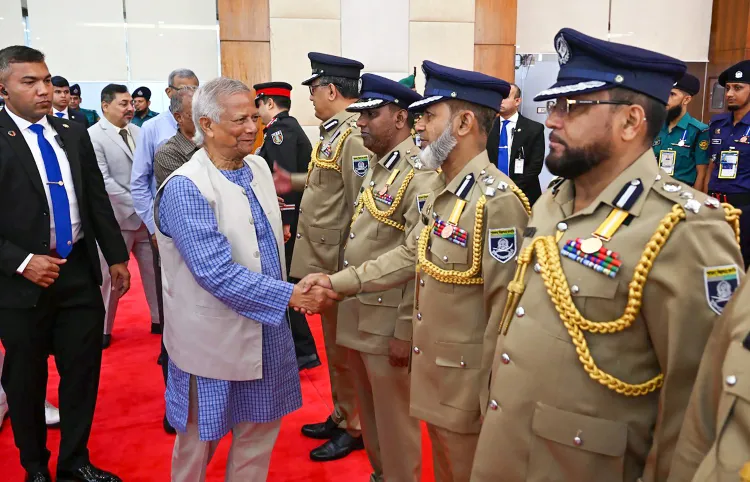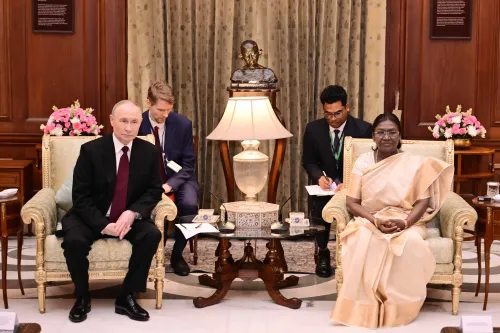Is Bangladesh's Military Under Siege from an Islamist Purge?

Synopsis
Key Takeaways
- Bangladesh is facing a significant constitutional crisis.
- The interim government is accused of targeting military leadership.
- The potential shift towards a theocratic regime is alarming.
- International intervention is necessary to restore democratic order.
- The role of the military is critical in safeguarding national sovereignty.
Dhaka: Bangladesh is currently experiencing an extraordinary crisis concerning its constitution and security. The interim government, headed by Muhammad Yunus, faces allegations of executing a calculated purge within the military as part of a wider Islamist-jihadist scheme. The issuance of arrest warrants for high-ranking officers, political maneuvering targeting military leaders, and overt efforts to transfer authority to religious extremists suggest that Bangladesh is on a precarious path toward a theocratic regime unless immediate checks and balances are reinstated.
In recent developments, arrest warrants have been issued for 25 active and retired military personnel, including Generals, who are charged with "crimes against humanity." Some individuals have already been reassigned to remote cantonments, while others are bracing for prosecution. Reports indicate that this list could expand to encompass as many as 150 officers, potentially affecting the leadership of the Army, Navy, and Air Force. Critics assert that behind this judicial purge lies a strategy to supplant the professional military with an ideologically aligned "Islamic Revolutionary Army," effectively transforming Bangladesh into an Islamist republic.
What is particularly concerning is the lack of response from the upper ranks of the military. Army Chief General Waker Uz Zaman and senior commanders have notably refrained from public commentary, a stark departure from their usual stance. Sources within defense circles point to rampant fear and profound uncertainty. Concurrently, regime-affiliated propagandists and Islamist activists are engaging in relentless campaigns aimed at discrediting the armed forces, labeling them as corrupt, anti-Islam, or connected to foreign plots.
The Islamist-jihadist connection in Bangladesh has deep historical roots. Following the violent political upheaval in August 2024, the country has become a breeding ground for Islamist movements. Local branches of Al Qaeda and ISIS have become increasingly prominent; Hizb ut-Tahrir has organized public demonstrations; and Jamaat-e-Islami is boosting its grassroots presence, even within Rohingya relief camps. Reports suggest that Pakistani intelligence (ISI) is collaborating through NGOs and Jamaat-linked networks, establishing cross-border avenues for support and recruitment. Additionally, Turkish Islamist influence appears to be expanding within Bangladesh, potentially complicating regional security dynamics.
Urgent warnings are already being raised. The US Embassy in Dhaka's Baridhara diplomatic zone has heightened security measures in light of credible intelligence regarding imminent jihadist attacks. Allegations also suggest that the regime is preparing to abolish the constitution and proclaim itself a "revolutionary" government—allowing Yunus to dismiss both the president and military leaders while indicting a larger number of officers. Trials for the 25 accused officers are scheduled to commence on October 22, with many potentially facing capital punishment.
This situation is not merely a regional issue. US strategic negligence has long enabled Pakistan’s ISI to exploit Islamist proxies, only to witness these networks undermine American interests later. Today’s Bangladesh is emerging as the next potential incubator for extremism. The Erdogan-Islamist coalition is reportedly deepening its foothold in Bangladesh through funding and logistical support. If this alliance remains unchecked, it could alter the strategic equilibrium of South Asia.
Domestically, the regime is systematically dismantling institutions. The Directorate General of Forces Intelligence (DGFI) and various security agencies are under attack, their credibility compromised, key officials indicted, and their autonomy jeopardized. This strategy seems to be a precursor to establishing an Islamist-controlled security force reminiscent of Iran's Islamic Revolutionary Guard Corps (IRGC).
Simultaneously, the regime is engaged in a narrative battle. A sophisticated information operation aims to portray security agencies as autocratic, un-Islamic, and corrupt, while portraying Islamist figures as heroic defenders. Social media, sympathetic media outlets, and foreign platforms are complicit in amplifying this propaganda.
If this campaign is permitted to succeed, Bangladesh will cease to exist as a constitutional democracy. Instead, it will evolve into a controlled theocracy with a militarized Islamist elite ruling through intimidation. The ramifications for India, Myanmar, and the wider region are profoundly concerning: a radical Islamist Bangladesh aligned with Turkey and Pakistan, serving as a hub for jihadist networks.
In this dire moment, regional powers—especially India and the United States—must take a definitive stance. They should publicly threaten sanctions, suspend security assistance, and demand the cessation of judicial purges, the reinstatement of neutral command structures, and the safeguarding of constitutional order. Silence is no longer an option; acquiescence would equate to complicity.
Bangladesh’s military, once a symbol of national sovereignty, stands at a pivotal juncture. It must decide between succumbing to ideological domination or reclaiming its role as the protector of the nation’s independence and secular foundation. The global community must not only observe but, more importantly, act.
(The author is an award-winning journalist and Editor of the Dhaka-based media outlet Blitz, specializing in counterterrorism and regional geopolitics. The views expressed are personal.)










